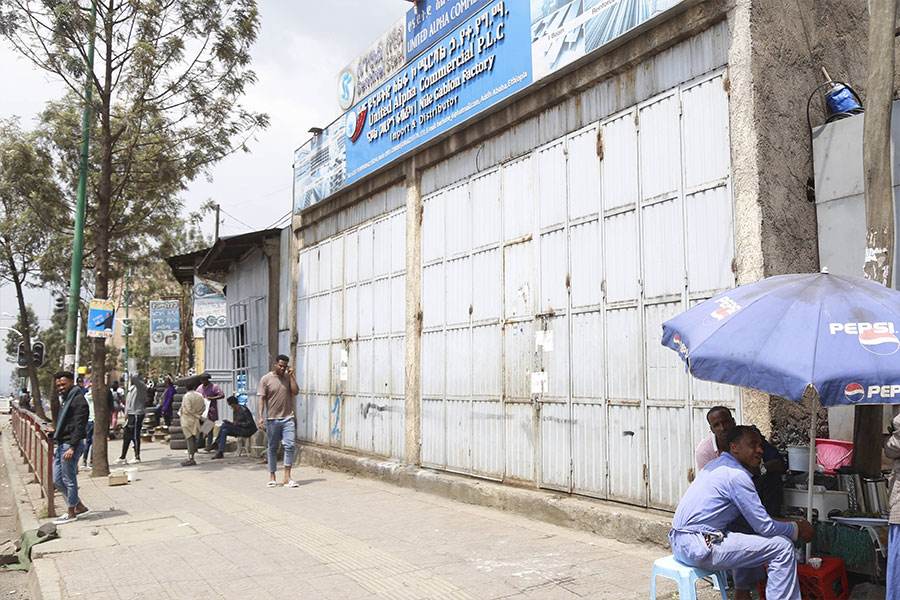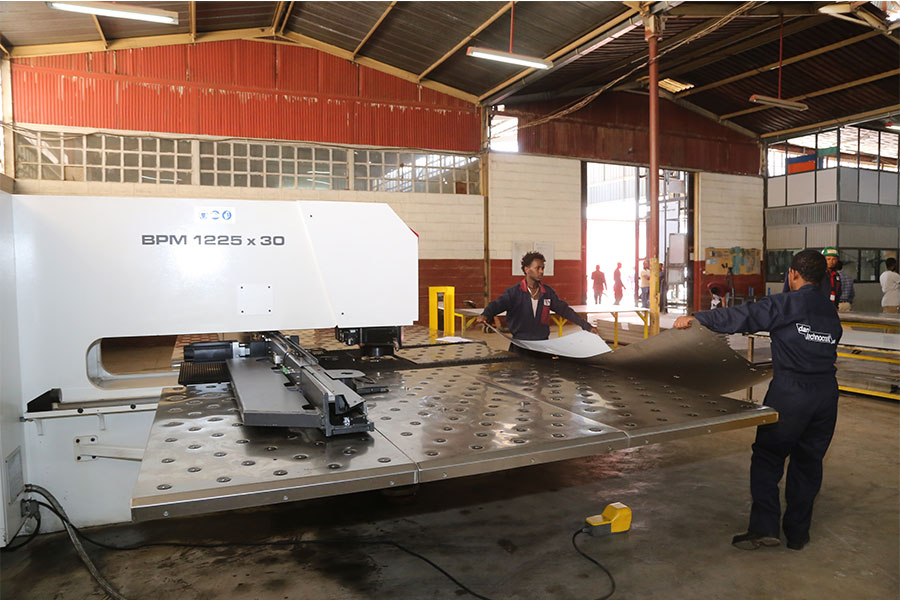
Fortune News | Oct 31,2020
The latest ban that limits the daytime movement of heavy trucks in the capital has frustrated businesses that depend on the trucks.
The ban that became effective this week was announced by Addis Abeba City Administration last month and sets time limits in which heavy trucks that weigh more than 2.5tn can be operated on city streets. The City Administration mentioned decreasing traffic congestion as well as air pollution and accidents as the main aim of the prohibition.
Light freight trucks like the Isuzu NPR with a weight between 2.5tn and 3.5tn are not able to operate in the city between 6:30am to 10:00am and from 4:00pm to 8:00pm. The law also forbids trucks from being parked on city roads during the time in which the ban is in effect.
The heavier trucks that weigh more than 3.5tn will not be able to move around within the city from 6:30am to 8:00pm. The ban is in effect for all days except Sundays. It also sets a time limit on the mobility of construction machinery vehicles, sewage trucks and water trucks. However, the ban does not affect police, defence forces and other emergency service providers.
The ban has not been welcomed by the city’s businesses such as contractors and horticultural operators that use the heavy trucks in their day to day operations.
“The ban on trucks in the daytime will have social and economic impacts. Developers and contractors who haven't anticipated the ban are stopping their projects, cancelling their contracts and laying off their workers,” tweeted Kebet Eske Ketema, a weekly radio program presenter on architecture, engineering, construction and urban living on ShegerFm 102.
One such contractor affected by the ban is Bamacon Engineering Plc.
Contractors cannot always resort to working at night, as they sometimes work in residential areas and the contracts forbid them from doing so, according to Alexander Assefa, general manager of Bamacon.
"Our construction activities have almost stopped, and at one construction site we are paying 40 idle day labourers," said Alexander.
Yemisrach Berhanu, promotion and information service department head at Ethiopian Horticultural Producer Exporters Association, also says that the ban does not take into consideration the transportation of perishable goods.
"We are currently in talks with the City Administration, the Ethiopian Investment Commission and the Addis Abeba Transport Management Agency over the issue," said Yemisrach.
The directive, in addition to empowering the Addis Abeba Traffic Management Agency to administer the ban, gives it the mandate to issue special permits that will allow some trucks to operate outside of the restriction.
The Agency has the discretion to grant exemption permits whenever it deems necessary, according to Semere Jelalo, deputy director at Addis Abeba Traffic Management Agency.
If the heavier trucks want to move around between 10:00am to 4:00pm, they can obtain a permit for a price of 500 Br a day for up to two months. And if both lighter and heavier trucks want to move around 24 hours a day, they can get a permit for 1,000 Br a day.
If trucks install a tracking device connected to the Agency’s system, they will get a 75pc discount. Truck owners will be fined 6,000 Br for each violation of the ban.
Currently, the city is giving permits to horticulture exporters together with meat and fruit exporters, while it is denying permits to contractors.
"We won’t even give a permit to those that transport perishable goods for domestic consumption," said Semere.
The City Administration believes that other groups of heavy truck users, except for perishable food exporters, can resort to other means.
"They can use smaller load vehicles and the ban on those that weigh over 2.5tn doesn't effectively put them out of business," Semere told Fortune.
However, heavy truck users argue that the use of smaller load vehicles in transporting their huge loads is neither practical nor effective.
Smaller trucks will have to do multiple trips to transport what a heavy truck could do in one, trip leading to further costs and the trucks spending more time on the road creating traffic congestion and defeating the very purpose why the ban was passed, according to Samuel Sahlemariam, a contractor.
But the City Administration says that it is already seeing the traffic congestion of the city improved since the ban began last week, and the ban is here to stay.
Through Transport Systems Improvement Project, a programme funded by 192.9 million dollars from the World Bank, Addis Abeba Road Transport Bureau has been working to improve the traffic congestion problem in the city.
The project aims to expand the existing traffic signal and control systems in the city, improve the conditions on selected streets for pedestrians, upgrade the capacity of transport institutions, as well as establish a database for driver and vehicle licensing.
There are around 585,000 vehicles in Addis Abeba, 60pc of the total vehicles in the country.
Experts in the area understand the intention behind the ban but argue that it will create unintended consequences.
The effective ban of heavy trucks is seriously affecting businesses, and they were not given sufficient time to adjust, according to Berhanu Zeleke (PhD), a lecturer in Kotebe Metropolitan University's faculty of urban development studies.
"If the City Administration intends to improve the traffic congestion and create a new working culture without greatly affecting the businesses," said Berhanu, "it should adapt to a time limit ban that progressively increases."
PUBLISHED ON
Jul 13,2019 [ VOL
20 , NO
1002]

Fortune News | Oct 31,2020

Fortune News | Dec 25,2021

Fortune News | Jan 01,2023

Agenda | Jun 29,2024

Featured | Jul 25,2020

Fortune News | Sep 22,2024

Agenda | Oct 09,2021

Fortune News | Apr 10,2021

Covid-19 | Sep 04,2021

Agenda | Apr 06,2019

Dec 22 , 2024 . By TIZITA SHEWAFERAW
Charged with transforming colossal state-owned enterprises into modern and competitiv...

Aug 18 , 2024 . By AKSAH ITALO
Although predictable Yonas Zerihun's job in the ride-hailing service is not immune to...

Jul 28 , 2024 . By TIZITA SHEWAFERAW
Unhabitual, perhaps too many, Samuel Gebreyohannes, 38, used to occasionally enjoy a couple of beers at breakfast. However, he recently swit...

Jul 13 , 2024 . By AKSAH ITALO
Investors who rely on tractors, trucks, and field vehicles for commuting, transporting commodities, and f...

Jul 5 , 2025
Six years ago, Ethiopia was the darling of international liberal commentators. A year...

Jun 28 , 2025
Meseret Damtie, the assertive auditor general, has never been shy about naming names...

Jun 21 , 2025
A well-worn adage says, “Budget is not destiny, but it is direction.” Examining t...

Jun 14 , 2025
Yet again, the Horn of Africa is bracing for trouble. A region already frayed by wars...